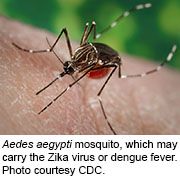Out of as many as 500,000 travelers, at most 37 are likely to contract Zika and return home contagious
TUESDAY, July 26, 2016 (HealthDay News) — Travelers and competitors at the 2016 Olympic Games in Brazil are not likely to contract the Zika virus during their stay or bring it back to their home countries, according to an Ideas and Opinions piece published online July 26 in the Annals of Internal Medicine.
The authors support the position taken by the World Health Organization. The WHO has said the Rio Olympics are not expected to play any significant role in the international spread of Zika. Out of as many as 500,000 travelers to Rio for the games, estimates state that at most 37 people are likely to contract Zika and return home while still contagious, the authors contend.
Other factors that will minimize the risk of Zika spread from the Olympics include the following: Zika infection clears the human body within 10 days, meaning people who become infected will likely not be contagious by the time they head home; more than half of Olympic visitors are expected to return to wealthy first-world countries where there’s little risk of establishing local transmission of Zika; and about another third of Olympic visitors will return to Latin America countries where Zika transmission is already established, and so won’t contribute to the epidemic. Overall, the authors estimate anywhere from six to 80 Zika infections in travelers to the Olympic Games, with just one to 16 of those people experiencing any symptoms.
“The decisions of many athletes to withdraw from the games over Zika virus fears have reinforced public perceptions of risk,” the authors write. “Communicating evidence-based assessments to policymakers, as well as through the media, is a top priority to inform the public of Zika virus risk and effective prevention measures.”
Full Text (subscription or payment may be required)
Copyright © 2016 HealthDay. All rights reserved.








